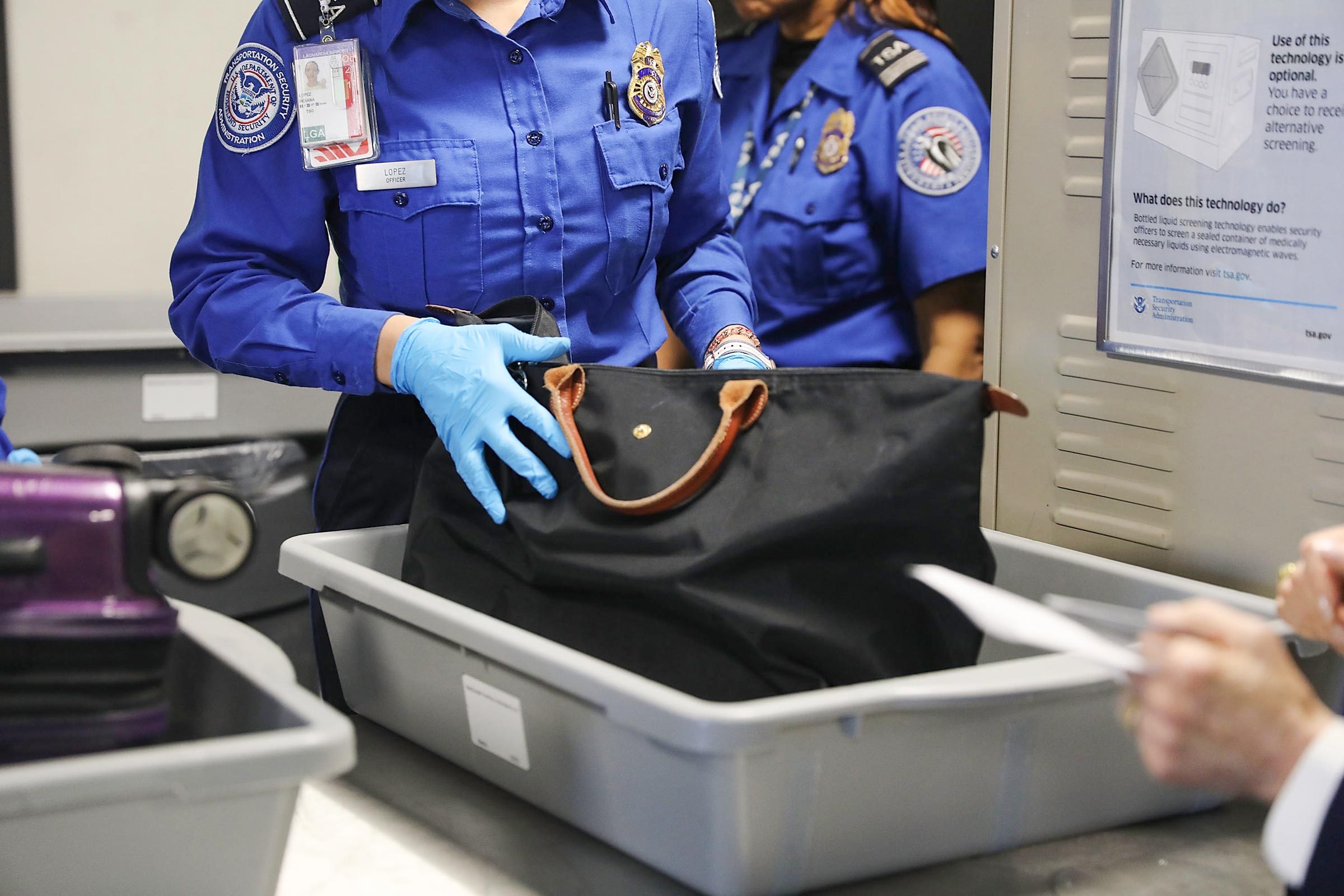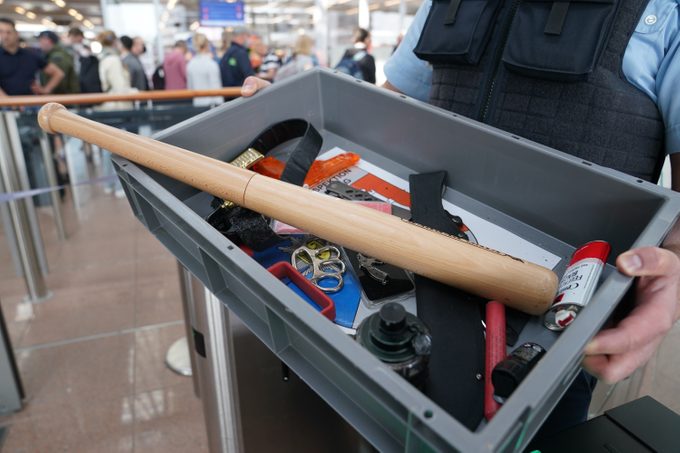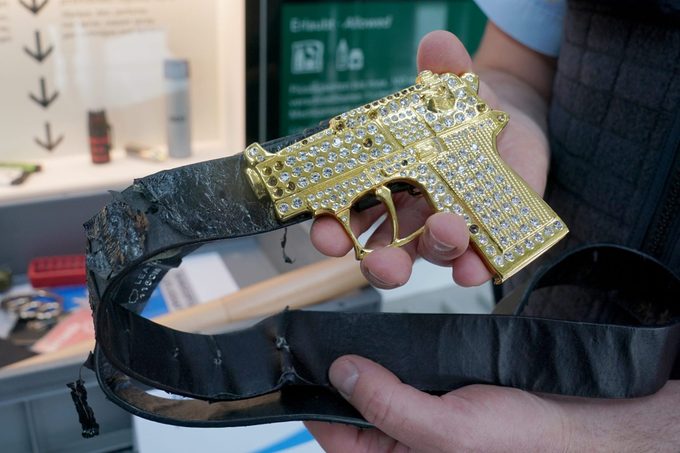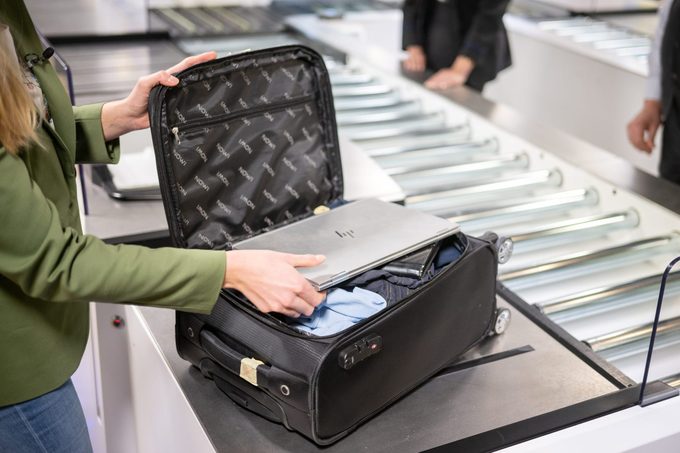What does TSA do with confiscated items after they're handed over? Here's what the government agency says about your prohibited belongings.

What Does the TSA Do with Confiscated Items?

It happens to the best of us. You arrive at the airport, head to the Transportation Security Administration’s (TSA) checkpoint and place your bag on the conveyor belt. Moments later, an agent asks, “Is this your bag?” before letting you know something inside it is not permitted. It happened to me last year (I forgot a water bottle), despite being an avid traveler who passes through airport checkpoints dozens of times yearly. It’s interactions like these that result in the TSA accumulating large amounts of discarded belongings, from perfume bottles, aerosols or liquids over the TSA limit to sharp objects, knives and flammables. But what does TSA do with confiscated items?
A few things, actually. However, it all depends on what type of belongings are handed over.”When you travel, it’s already kind of a hectic time, and you forget things,” says Dan Velez, a TSA spokesperson for the New England region. “It’s typical for people to forget what they actually have in their carry-on bag.” Additionally, there are a number of items banned from airplane travel that end up being handed over at checkpoints across the country.
But what happens to those belongings that are left behind? And is there any hope of getting them back? We tapped the two experts to get the full rundown—keep reading to learn more.
Get Reader’s Digest’s Read Up newsletter for travel, cleaning, humor, tech and fun facts all week long.
What does the TSA do with confiscated items?
OK, so what does TSA do with confiscated items, exactly? Let’s start by getting one thing straight: The TSA doesn’t actually confiscate your items. Yes, there are strict TSA carry-on rules and other items banned from air travel. But a TSA agent’s job is not to confiscate those items—it’s simply to identify items prohibited from flying and let you know that they can’t pass through security (at least in your carry-on bag).
“Passengers with prohibited items are given a choice,” says TeaNeisha Barker, a TSA uniformed advisor.
Per Barker, you have a few options:
- Surrender it to agents at the checkpoint.
- Check your bag with the item(s) inside.
- Take it back to your car or give the item to a non-traveling companion.
“They surrender the items to us in order to continue,” Velez explains. “Say you have a bottle of shampoo, and it’s eight ounces and in your carry-on bag. We will let you know you’re over the limit with your liquid. You can keep your shampoo bottle, but you’re not going to go through to the secure side [with it].” If you want to board your flight, you’ll have to surrender the shampoo bottle or find something to do with it.
Barker echoes Velez’s sentiments and explains that while “gels and aerosols are thrown in the trash, knives, tools and any items that could be considered bludgeoning weapons are turned over to the state.” From there, she says, “it is then up to the state to decide whether to dispose of the item or auction it off.” Often, she says, the state does opt to sell the item[s] “and then keeps any profit”—but more on this in a bit.
How many items are confiscated by TSA every year?

As you might expect, travelers surrender a lot of stuff to TSA agents, considering the agency screens approximately 1.3 million checked bags and 3.3 million carry-on bags daily. Because there are a number of categories of prohibited items, it’s hard to know just how many items the agency ends up with, whether it’s bottles of water and sunscreen that customers discard, items lost and found at checkpoints or knives and other items that aren’t allowed on a plane.
In general, these are items that are in travelers’ carry-on bags that TSA agents find. The traveler must surrender these in order to board their flights. In most cases, Velez says, the excuse agents get is that the traveler simply forgot the prohibited item was in their bag.
There is, however, one category of items the TSA keeps very close track of: firearms found in carry-on bags. This number has been on the rise. In 2023, the TSA found a record 6,737 firearms, exceeding the record number of firearms found in 2022 (6,542). Additionally, during the first nine months of 2024, the TSA detected 5,028 firearms at security checkpoints.
What are the most commonly confiscated items at the airport?
We already know that TSA-confiscated items aren’t a concern since the agency doesn’t actually confiscate them; rather, most are voluntarily surrendered. According to Barker, the most common items that are voluntarily surrendered at airport security checkpoints include “oversized liquids, oversized gels, oversized aerosols, knives and tools larger than seven inches.” These are items that many travelers regularly carry and might not think about before heading to the airport.
What happens to illegal items, such as firearms or drugs?
Packing certain items in your bags can land you in trouble. Namely, packing a gun or explosive in your carry-on bag can land you in quite a bit of trouble. Even for concealed carry permit holders, guns are prohibited at checkpoints, in the secure area of an airport and on board commercial aircraft (you can put guns in a checked bag, provided you meet strict rules for properly packing and securing the weapon and any ammunition).
If one of these items is found in your carry-on bag, the TSA will hold it and contact local law enforcement to perform further inspection. It’s then up to local law enforcement to decide what happens to your property and you as it relates to any potential criminal charges. The TSA could also impose a civil penalty of up to $14,950 and eliminate your TSA PreCheck eligibility for five years.
When it comes to drugs, the TSA does not specifically search for them. However, the agency does have to report potential violations to law enforcement. It gets a bit more complicated when it comes to possessions such as marijuana (including medical marijuana), which is legal in some states, but not in others (or federally, where it remains illegal).
The TSA lists medical marijuana as an item that can be packed in a carry-on bag, though there are special instructions. “TSA’s screening procedures are focused on security and are designed to detect potential threats to aviation and passengers,” the agency explains. “Accordingly, TSA security officers do not search for marijuana or other illegal drugs, but if any illegal substance is discovered during security screening, TSA will refer the matter to a law enforcement officer.” As such, whether you’d ultimately get in trouble would depend on the laws wherever you are (and, perhaps, wherever you’re flying).
What are some of the weirdest items confiscated by TSA agents?

Although sunscreen bottles and hair products are the more common items that are surrendered to TSA agents, they’ve also made some much stranger discoveries. Here are a few of the unusual things found in the TSA’s annual “Top 10 Catches of 2023.”
- Knives hidden in some pretty odd spots, including inside a loaf of keto bread and a prosthetic
- Replica rockets
- Drugs inside diapers and a container of crab boil seasoning powder
- An improvised explosive device (IED) hidden inside an energy drink
Can you get confiscated items back?
Once you choose (again, voluntarily) to surrender a possession at a TSA checkpoint, is there a way to get it back? The short answer is no, Velez says. So what does TSA do with these items? When travelers surrender items, agents alert them that they likely won’t see them again. (Some airports do offer a mailing station near the metal detectors, so you can pay to mail small items back to your home, rather than surrendering them.)
The government has strict rules it must follow for disposing of surrendered property, according to the TSA. Guns, weapons, hazardous materials or anything deemed illegal are turned over to local law enforcement. Forbidden liquids are immediately disposed of. All other items are either turned over to state agencies or kept by the TSA to be disposed of through sales, destruction or donations to charity.
“We collect that stuff for anywhere from one to three months, and then a state surplus store will come by. We give all the stuff that was surrendered to the state surplus store, and they auction it off,” Velez says. You can try searching for your discarded property via GovDeals, where some state agencies sell surplus goods via a bidding sale—but it’s hardly a foolproof method, and you may have to pay a few bucks to get your items back.
Any profit from TSA sales of confiscated items goes to the U.S. Department of the Treasury and into a general fund used to help pay off the U.S. national debt.
What kinds of confiscated items can you currently buy?
While there are no TSA confiscated items for sale since the agency doesn’t actually confiscate your items, you can log onto the surplus site GovDeals.com, you can find all sorts of items up for bid, some of which (like copy machines) clearly came from offices or government facilities. But some were previously surrendered at an airport.
For instance, there’s a listing for nine pounds of “assorted nail clippers and knives,” with bids starting at $2. There’s a whole shipping container full of toys, many of which appear to be toy guns, water guns and similarly shaped items. One look here will give you a sense of just how much stuff the agency accumulates at these checkpoints.
Here are some additional items you can buy on GovDeals.com:
- Ovens
- Motorcycles
- Clothing and accessories
- Jewelry
- Machinery
- Laundry equipment
- Trailers
- Trucks
- Fine art
- Health and beauty products
- Exercise equipment
How can you avoid having items confiscated?

Your best bet is to study up on the rules of airplane travel.
- When you pack, start with an empty suitcase. That way, there are no surprise items that turn up in your bag.
- Remember the 3-1-1 rule for liquids in carry-on bags. Liquids must be less than 3.4 ounces. They must be placed in one clear, resealable quart-size plastic bag. And one such bag is allowed per traveler.
- Get to the airport early enough. If you happen to have an item in your bag that isn’t permitted, you have time to take it back to your car.
- When traveling during the holidays, don’t wrap gifts before flying (the TSA may have to unwrap them).
- Don’t ever pack firearms, knives or weapons in your carry-on bag.
Ultimately, this due diligence will not only help you, but the travelers around you too. “Anytime you have two, three, four people in front of you, and they have a prohibited item, it does slow down the line,” Velez says. “So that’s unfortunate. We try to resolve those incidents as quickly as possible.”
Additional reporting by Charlotte Hilton Andersen.
About the experts
|
Why trust us
Reader’s Digest has published hundreds of travel stories that help readers explore the world safely, easily and affordably. We regularly cover topics such as the best places to visit (and the best times to visit them), tips and tricks to zoom through airport security, flight-attendant secrets, hotel-room hacks and more. We’re committed to producing high-quality content by writers with expertise and experience in their field in consultation with relevant, qualified experts. We rely on reputable primary sources, including government and professional organizations and academic institutions as well as our writers’ personal experiences where appropriate. For this story on airplane etiquette, Sean Cudahy tapped his longtime experience as a travel writer. We verify all facts and data, back them with credible sourcing and revisit them over time to ensure they remain accurate and up to date. Read more about our team, our contributors and our editorial policies.
Sources:
- Dan Velez, spokesperson for the New England region of the Transportation Security Administration.
- TeaNeisha Barker, uniformed advisor for the Transportation Security Administration.
- Transportation Security Administration: TSA stopped 5,028 firearms at airport security checkpoints nationwide during the first nine months of 2024″
- Transportation Security Administration: “Security screening”
- Transportation Security Administration: “TSA detects 6,737 firearms at airport security checkpoints in 2023”
- Transportation Security Administration: “TSA breaks yet another record nationally for firearm discoveries in 2022”
- Transportation Security Administration: “Travel Checklist”
- TSA on YouTube: “TSA’s Top 10 Best Catches 2023”
- Transportation Security Administration: “Medical Marijuana”
- Transportation Security Administration: “Transporting Firearms and Ammunition”
- GovDeals: “Approx. 9 lbs. of Assorted Nail Clippers/Etc.”























